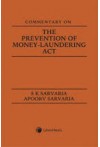- Author(s): S.K. Sarvaria
- Publisher: Universal LexisNexis
- Edition: 1 Ed 2025
- ISBN 13 9789391211653
- Approx. Pages 868 + Contents
- Format Hardbound
- Approx. Product Size 24 x 16 cms
- Delivery Time 3-5 working days (within Kerala & South India) (Others 7-9 days)
- Shipping Charge Extra (see Shopping Cart)
............................................................................................................................
Description
Commentary
on The Prevention of Money-Laundering Act is an in-depth analysis of Prevention of Money-laundering Act
2002 (PMLA)
which was enacted to prevent economic offences and
white collar crimes. Vital amendments in the legislation relating to the Act have been covered extensively in this book. The book has an
exhaustive collection of important judgments rendered by the Apex Court and
various High Courts. The book lists out various offences constituted under related acts such as Black
Money (Undisclosed Foreign Income and
Assets) and Imposition of Tax Act 2015 and Smugglers and Foreign Exchange
Manipulators (Forfeiture of Property) Act 1976. This book is a boon not only for Judges, Advocates and students but also
bankers and police personnel to control the persons having tendency to commit scheduled offences listed under this Act.
.............................................................................................................................
Contents
The Prevention of Money-Laundering Act
1. Scheme of Act
2. Initiatives Taken by the United Nations
3. Financial Act Task Force (FATF)
4. The Basel Committee on Banking Supervision (BCBS)
5. Wolfsburg Group of Banks
6. Other International Efforts for Prevention of Money-laundering
7. Interpretation
8. Provision of the Act to be Interpreted Within Framewrok of
Constitution and not as per International Convention
9. Legislative Errors can be Rectified by Interpretation
10. Interim Order cannot be of Construction
11. Literal/Primary Rule of Construction
12. Secondary/Golden Rule of Construction:
13. Tertiary/Mischief/Purposive/Benignant Rule of Construction
14. Aids to Interpretation
15. Internal Aids
A. Definitions
B. Exceptions
C. Explanations
D. Fictions
E. Deeming provision
F. Headings
G. Marginal Notes
H. Preamble
I. Provisos
]. Punctuations
K. Saving Clauses
L. Non Obstante Clauses
16. External Aids
A. Dictionaries
B. Earlier Acts
C. Parliamentary History of Legislation
D. Reports of the Committees
E. The Statement of Objects and Reasons of the Statute
17. Legal Maxims
A. Contemporanea Expositio Est Optima Et fortissimo In Lege
B. Nosdtur A Sociis
C. Ejusdem Generis
D. Expressio Uniits Est Exdusio Alterius
E. Generalia Specialibus Non Derogant
F. Ut Res Mogis Valeat Quam Pereat
18. Precedent
19. Binding Inter Party Judgments Cannot be Reopened in Subsequent Proceedings
20. Judicial Discipline Requires Judgments of Higher Court Should be Followed
21. Issue-Estoppel
Chapter 1 Preliminary
Chapter 2 Offence of Money- Laundering
Chapter 3 Attachment, Adjudication and Confiscation
Chapter 4 Obligations of Banking Companies, Financial
Institutions and Intermediareis
Chapter 5 Summons, Searches and Seizures, etc.
Chapter 6 Appellate Tribunal
Chapter 7 Special Courts
Chapter 8 Authorities
Chapter 9 Reciprocal Arrangement for assistance in certain matters and procedure of
attachment and consfiscation of property
Chapter 10 Miscellaneous
Subject Index
.............................................................................................................................
Author Details
S. K. Sarvaria is author/revising author of several law books. His daughter Snigdha Sarvaria and son Apoorv Sarvaria who have helped him in the present work are working as judicial officers of Delhi Judicial Service in Delhi. Another co-author , his daughter-in-law Yashika Sarvaria is an advocate who is associated with a reputed law firm in Delhi doing international arbitration matters. He joined Delhi Judicial Service in September 1980 and was promoted to Delhi Higher Judicial Service in November, 1997. After completing his long and distinguished service tenure. He recently retired on 30/11/2013 as District and Sessions Judge (Northwest), Delhi. As judicial officer in Delhi Judicial Service he worked as Metropolitan Magistrate, Civil Judge, Additional Rent Controller and while working in Delhi Higher Judicial Service he worked in various capacities as Presiding Officer of Labour Courts, Court of Sessions, Court of District Judge, Additional Rent-Control Tribunal in District Courts in Delhi from time to time and has also worked as Presiding Officer of Registrar1 s Court in Delhi High Court. Presently, he is working as President, District Consumer Disputes Redressal Forum (Southwest), Delhi.
.............................................................................................................................

